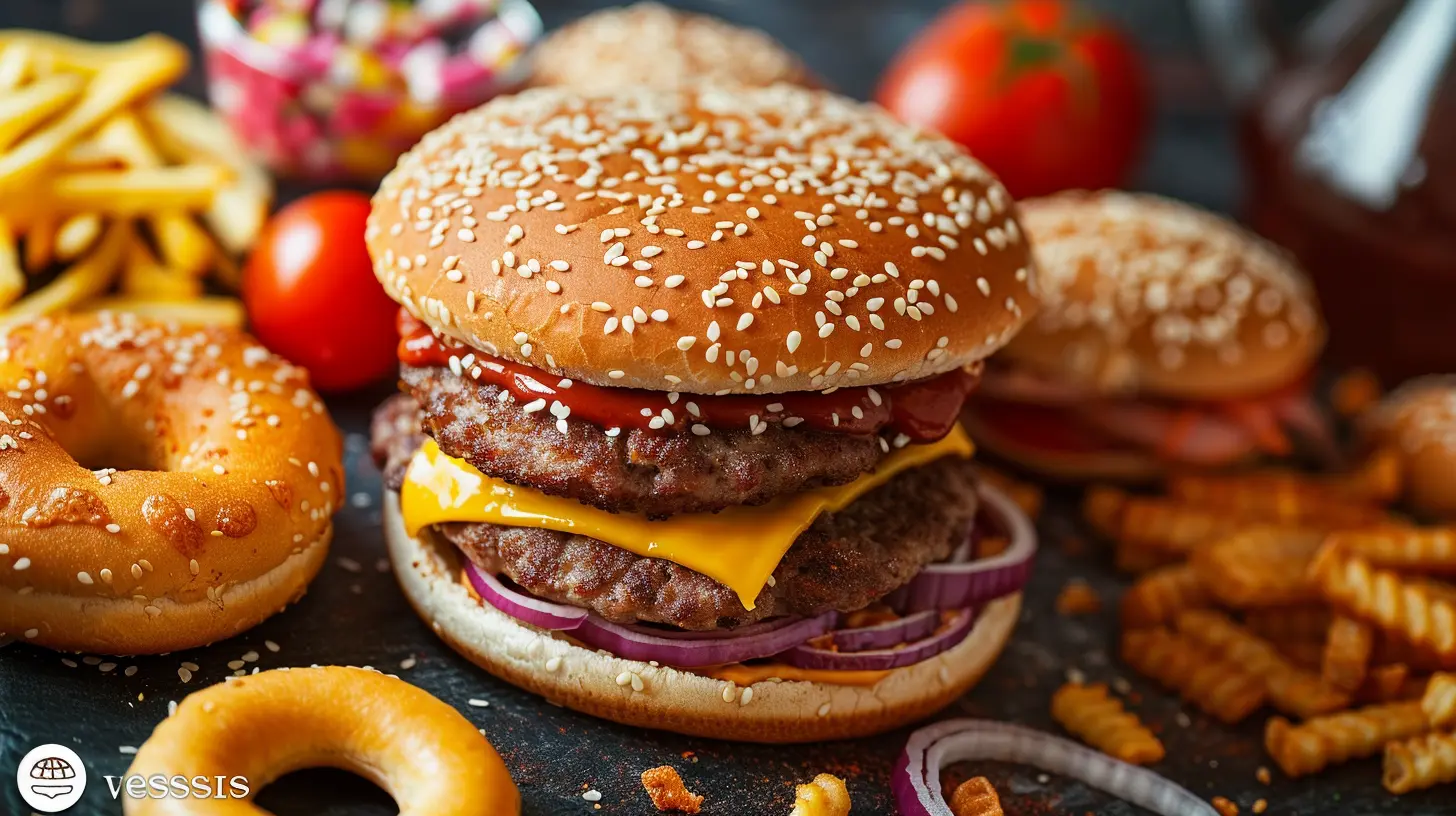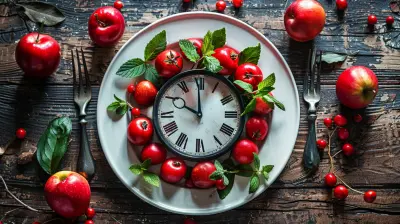Are Cheat Meals Hurting Your Weight Maintenance Goals?
13 November 2025
Let’s talk about something that’s both super tempting and slightly controversial in the world of healthy living: cheat meals. You’ve probably heard that the occasional cheat meal can help you stay sane during a strict diet. But have you ever stopped to wonder—are cheat meals actually hurting your weight maintenance goals?
You’re not alone if you’ve felt confused about how to approach them. On one hand, everyone swears they help with mental cravings. On the other, your scale seems to jump up the day after, and that guilt trip? Yeah, it’s real.
Let’s break it down and find out if cheat meals are your best friend… or that sneaky frenemy sabotaging you behind your back.
What Is a Cheat Meal, Really?
First off, let’s define what we’re talking about. A cheat meal is when you intentionally eat something that doesn't align with your regular diet plan.Typically, it’s high-calorie, loaded with sugar or fat, and the kind of food you'd avoid most days—think burgers, pizza, desserts, or a heaping plate of cheesy nachos. It’s different from a cheat day, where people allow themselves to eat freely for an entire day (which can be a whole different beast in terms of impact).
The theory? By giving yourself permission to indulge occasionally, you can stay motivated to stick with your clean eating the rest of the time. You scratch the itch without losing your mind.
Sounds fair, right?
The Psychological Power of Cheat Meals
Here’s the deal: we’re human. Restrict us too much, and we will rebel. Cheat meals can offer psychological relief—a kind of “reward” for your hard work. It’s like giving yourself a small break so you don’t blow up the whole plan.Ever tried going weeks without your favorite food? It starts to haunt your dreams. Having a set time when you can indulge can take that edge off. Some people say knowing there's a cheat meal on the weekend helps them stay on track during the week.
But here's the twist...
Yes, cheat meals can be mentally refreshing. But they can also create a toxic cycle of binging and guilt—especially if you tend to label foods as “good” or “bad.” Once you tell yourself you’ve been “bad,” it’s easy to spiral with more unhealthy decisions. And that emotional rollercoaster? It can derail your long-term weight maintenance in a big way.
Do Cheat Meals Affect Metabolism?
You've probably heard the idea that cheat meals "jumpstart" your metabolism by shocking your body after a period of calorie restriction. The science behind this is tied to something called leptin—a hormone that helps regulate energy balance and hunger.When you restrict calories, leptin levels drop, which can slow your metabolism. The theory is that a high-calorie cheat meal can spike leptin again, giving your metabolism a temporary boost.
Sounds promising, right?
Here's the catch. While it’s technically true that leptin responds to calorie intake, most cheat meals don't offer a big enough or long-lasting enough impact to make a dramatic difference. You're not going to reverse weeks of slowed metabolism in one greasy dinner.
So the metabolic “boost” you hear about? It's real... but often overstated.
Cheat Meals and Weight Maintenance: The Cold, Hard Reality
Let’s cut to the chase: maintaining weight is all about balance.Weight loss is tough. But weight maintenance might be even trickier. It’s easy to slip back into old habits once you’ve hit your goal, and cheat meals can be that slippery slope.
Here’s how they can mess things up:
1. They Often Lead to Overeating
One cheat meal won’t sabotage your progress. But when that cheat meal turns into a binge or blends into a full cheat day, you're consuming hundreds, sometimes thousands, of extra calories. Do that weekly, and it adds up fast.It’s like trying to fill a bathtub with the drain open—your hard work during the week can get washed away in just one night.
2. They Can Trigger Cravings
Once you open the floodgates with sugar, salt, and fat, your body wants more. Cheat meals often reignite cravings you've worked hard to manage. You're suddenly battling urges you thought were behind you.It's kind of like getting back with an ex—you remember all the good times (hello, pizza!) and forget why you broke up in the first place.
3. They Can Reinforce a Bad Relationship With Food
Labeling meals as “cheats” can mess with your mindset. It implies you’re doing something wrong or shameful. And that guilt can mess with your self-esteem and motivate emotional eating.A healthy approach to food shouldn’t feel like punishment or rebellion—it should feel like freedom.
The Science Behind Weight Regain
Cheat meals might not cause instant weight gain, but they can lead to subtle shifts that make weight maintenance harder over time. A study in the American Journal of Clinical Nutrition found that even after weight loss, the body adapts by slowing metabolism and increasing hunger signals.In that delicate stage, frequent calorie splurges can edge you into a surplus before you even realize it. Your body’s already primed to gain weight back—it doesn’t need much encouragement.
So while that cheat meal feels like a reward, it might be nudging your body back toward the set point it worked so hard to leave behind.
Is There a Smarter Way to “Cheat”?
Absolutely. The key isn’t just avoiding cheat meals altogether—it’s rethinking how you approach them.1. Ditch the “Cheat” Language
Words matter. Instead of calling it a cheat, think of it as a “planned indulgence” or a “flex meal.” That shift in mindset can help remove guilt and reduce the risk of emotional eating.You’re not cheating—you’re being intentional. Big difference.
2. Plan, Don’t React
The worst cheat meals are the spontaneous ones triggered by stress or boredom. But if you plan ahead—say, making Saturday night your indulgence—you’re more likely to make balanced choices and not go overboard.It’s the difference between mindfully eating a slice of cake and accidentally eating the whole thing while watching TV.
3. Control Your Portions
You don't need to eat an entire pizza to enjoy it. Savor a few slices with a side salad. Split that dessert with a friend. Get the flavor, not the fallout.4. Balance It Out
If you know you’re going to have a calorie-heavy meal, balance it by keeping the rest of your day lighter and more nutrient-dense. Think fruits, lean proteins, leafy greens.It’s like budgeting for a big purchase—spend a little more here, save a little there.
Listen to Your Body, Not Just Your Cravings
This might sound a little woo-woo, but bear with me. Your body knows what it needs—it’s your mind that throws a tantrum. When you feel the urge to “cheat,” ask yourself:- Am I actually hungry?
- Am I emotional right now?
- Will this make me feel better or worse afterward?
Being aware of your triggers can help you make better decisions that align with your long-term goals.
The Bottom Line
So, are cheat meals hurting your weight maintenance goals?The answer isn’t a simple yes or no. It depends on how you approach them.
If you use cheat meals as an occasional treat, plan them with intention, and stay mindful of portions, you can absolutely fit them into a healthy lifestyle.
But if they become frequent, emotional, or excessive, they can quietly creep in and sabotage your progress without you even realizing it.
Health isn't about perfection—it’s about consistency. Don’t aim to be flawless. Aim to be aware, intentional, and kind to yourself.
Because at the end of the day, sustainable weight maintenance isn’t about one meal. It’s about what you do, most of the time.
Final Thoughts
If cheat meals are part of your life, you’re not doing it “wrong.” Just make sure they’re truly serving you—not the other way around.Remember, you’re in the driver’s seat. You get to decide what your health journey looks like. So go ahead and enjoy that burger—just don’t let it become the boss of you.
all images in this post were generated using AI tools
Category:
Weight MaintenanceAuthor:

Angelo McGillivray
Discussion
rate this article
1 comments
Zayden Duke
Cheat meals can disrupt weight maintenance efforts if not managed carefully. While they provide a psychological break, they can lead to overeating and ineffective portion control. Balance and moderation are key; enjoy cheats mindfully to support long-term goals without derailing progress.
November 16, 2025 at 6:06 AM

Angelo McGillivray
I completely agree! Balancing cheat meals with mindful eating is crucial to avoid setbacks while still enjoying the process. Moderation truly is the key to maintaining long-term weight goals.


